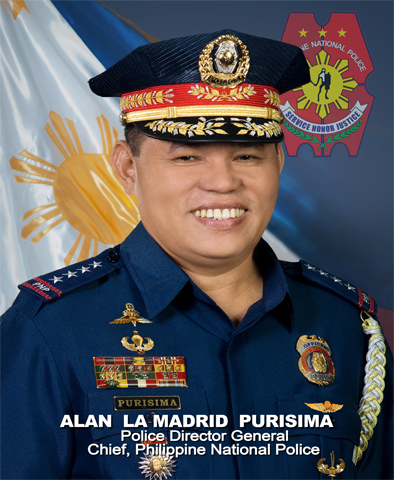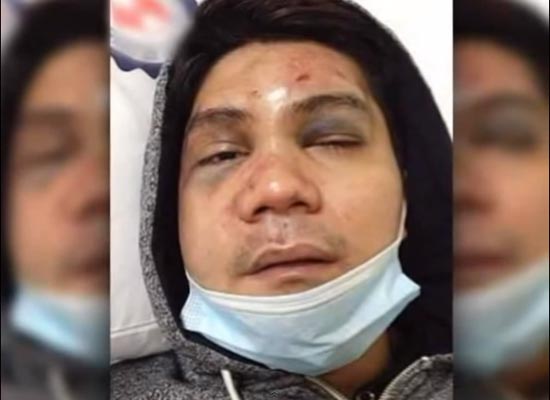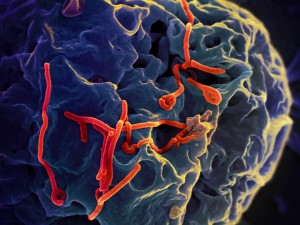2014 in review: The forte of ’14
2014, it seems, has a forte: bringing out and amplifying the negatives. If you are superstitious, you would probably link these negatives with how the number 14 is associated with some notably unfavorable events in history, from the brutal massacre of the Marsi tribe on the upper Ruhr river to the famine in China that forced some citizens to become cannibals. This year has shown many unfortunate and unfavorable events that rocked the nation. Fortunately, 2014’s ability to bring out and magnify the negatives does not appear to be an entirely negative attribute. As 2014 spotlighted the many defects in the Philippine socio-political landscape, the country was and is being compelled to address all of these undesirable realities.
Here’s a summary of the bad, unflattering, and undesirable things and events 2014 has brought to the Philippines.
Wheel of torture, cop crimes, and Puri-sama
In January, 10 Philippine National Police officers were sacked after it was revealed that a “wheel of torture” game was being “played” at a secret PNP detention facility. The tortures were reportedly committed not only to extract information or facilitate the solving of cases but also, allegedly, for fun. This “wheel of torture” scandal proved to be a harbinger of what’s to roll in when it comes to anomalies and illegal practices in the country’s police force.
“Hulidap” became a popular buzzword this year as successive reports of crimes committed by police officers dominated the local newscasts for some time. One incident happened in broad daylight on EDSA and was fortunately videoed by a concerned citizen. Nine to twelve cops were involved in this video documented embarrassing crime committed by members of the country’s police force. The cops involved in the EDSA hulidap case turned out to have also been involved in other similar cases in the past. Several other reports of police abuse and criminal acts emerged, including the alleged involvement of anti-carnapping cops in the extortion of a Pakistani car dealer.
Unfortunately, the Philippine National Police embarrassment didn’t just end with highway robberies, extortion, and other local crimes. Somebody had to make a scandal at the national level and it happened to be President Aquino’s close buddy, the PNP chief himself, Alan Purisima. Several undisclosed properties of the PNP’s top brass were exposed by media reports, including a rest house in Batangas, a modern chicken farm, and a condominium unit. Purisima was also assailed for accepting an undocumented donation (a donation according to Purisima) for the renovation of the P25 million “White House,” the official residence of the PNP Chief at Camp Crame. There were also allegations of anomalous contracts in the PNP under Purisima’s administration. It’s regrettable to see how President Aquino once more demonstrated his excessive trust and bias for his friends and allies. He never ordered investigations against Purisima. He did not even bother to ask him to offer an explanation to the people, his “bosses.” So much for the Tuwid na Daan shibboleth.
Vhong and Bong: beaten and beating around the bush
Vhong Navarro became a top story for several weeks this 2014 for unflattering reasons. The noontime show host and comedian was so badly beaten that he gained awkward “Panda eyes,” which solicited hesitant smirks or empathy. The Vhong Navarro incident raised awareness on two important things – the idea of serious illegal detention (a non-bailable offense) and the sinister character of Cedric Lee. Not many know that detaining a person and inflicting serious injuries on the person or threatening the person’s life can be considered as a form of serious illegal detention (a non-bailable offense) even if the period of detention does not exceed five days, and even if the person detained is not a minor, a female, or a public officer. Similarly, not many know who Cedric Lee was until his name was dragged as the main suspect in Navarro’s beating.
If Vhong Navarro was beaten, Bong Revilla Jr. (yes, the senator) in 2014 used the word “beat” in some other way. He was conspicuously and capriciously beating around the bush as he attempted to divert the issues of corruption hurled against him. He gave two privilege speeches in the Senate supposedly in response to the issues he was being embattled with. However, none of these speeches offered clear answers, arguments, or evidences that would support his claim of innocence. For most people, what could be remembered from these speeches are probably the toy car in the first and Revilla’s awful singing in the second.
Sensationalizing: Misteryosong sakit
A reporter of ABS-CBN, Jasmin Romero, apparently wanted to sensationalize a report on a disease she knew nothing about and even had a hashtag for it (#MisteryosongSakitsaBandila). She conducted her patient interviews with protective gear on, as if she was dealing with Ebola-afflicted people. In hindsight, it is very likely that she would have gotten away with the sensationalizing and imprudence if only she did not mention the location (Pangasinan). Because of the report, Pangasinan’s tourism and reputation were badly affected. Netizens were quick to castigate Romero and ABS-CBN for the damagingly cavalier reporting on a disease which turned out to be not that much of a serious concern. The Department of Health called it a hoax. To make matters worse, the anchors who presented Romero’s story ended it with the question: “May kinalaman kaya ang misteryosong sakit na ito sa isang prophecy?
We already know how bad media sensationalism is in this country. This year is teaching us that something has to be done with it. The online uproar on the damaging “misteryosong sakit” report and the suspension of Jasmin Romero should be enough lesson and impetus to implement the necessary changes. Philippine media organizations are the ones suffering from a “mysterious disease” they refuse to acknowledge and cure.
Selective prosecution
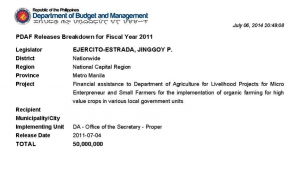 Finally, high ranking public officials are experiencing something they ought to have experienced a long time ago. After the PDAF scam exposé involving Benhur Luy and Janet Napoles, finally, at least three senators have been sent to jail. Senators Juan Ponce Enrile, Jinggoy Estrada, and Bong Revilla are expected to end their terms still incarcerated. Hopefully, the wheels of justice turn the way they should. It’s still disheartening to see the rest of the heavyweight political figures implicated by Napoles in her testimonies and documents still enjoying freedom. Of note, all of those who have been charged or arrested happen to be political opponents of the Aquino administration. Aquino allies who have been clearly named by Napoles are not being investigated. Secretary Butch Abad, in particular, the man alleged by Janet Napoles to be her (malversation) mentor, is even allowed to do campus tours to defend himself. It’s still the same old traditional politics after all.
Finally, high ranking public officials are experiencing something they ought to have experienced a long time ago. After the PDAF scam exposé involving Benhur Luy and Janet Napoles, finally, at least three senators have been sent to jail. Senators Juan Ponce Enrile, Jinggoy Estrada, and Bong Revilla are expected to end their terms still incarcerated. Hopefully, the wheels of justice turn the way they should. It’s still disheartening to see the rest of the heavyweight political figures implicated by Napoles in her testimonies and documents still enjoying freedom. Of note, all of those who have been charged or arrested happen to be political opponents of the Aquino administration. Aquino allies who have been clearly named by Napoles are not being investigated. Secretary Butch Abad, in particular, the man alleged by Janet Napoles to be her (malversation) mentor, is even allowed to do campus tours to defend himself. It’s still the same old traditional politics after all.
MRT inconveniences, derailment, and accidents
One of the country’s slightly less criticized modes of transportation, the Manila Metro Rail Transit System (MRT), suffered major malfunctions and accidents this year. The accidents were said to have already been foreseen but not anticipated by authorities. As usual, citizens demanded accountability and government investigations were initiated. It’s the same old knee jerk reaction from the government, which even attempted to pass the blame to private contractors. If it’s any consolation, the accidents drew in the needed attention on the MRT’s woes, from the required hardware upgrades to the need to clarify and establish the responsibilities of the government and the contractors involved in running the transport system.
The MRT issue also brought with it the fad of public officials and celebrities having their first or rare ride on the MRT. It’s a quite useful publicity stunt that somehow helped attract attention to the MRT’s problems, although it may have not really contributed much to solving problems. Department of Transportation Secretary Jun Abaya’s publicized MRT ride even irritated many as he reported that he had a pleasant ride, contrary to what most other MRT riders’ experience. He actually avoided the rush hour so his claim was not fallacious, but he certainly mocked the purpose of doing the MRT rush hour ride challenge.
Looming power crisis
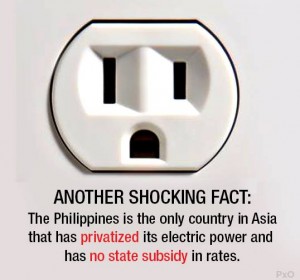 The power crisis has already been affecting many parts of the country although it is supposed to only drop its full weight next year. In 2014, the main issue was not on the availability of power; it’s more of the ability of the powers that be to come up with meaningful solutions. The real extent of the expected power crisis has not manifested yet but everything is already being eclipsed by ineptness and excessive politicking. Even Aquino’s allies have been assailing his indecisiveness.
The power crisis has already been affecting many parts of the country although it is supposed to only drop its full weight next year. In 2014, the main issue was not on the availability of power; it’s more of the ability of the powers that be to come up with meaningful solutions. The real extent of the expected power crisis has not manifested yet but everything is already being eclipsed by ineptness and excessive politicking. Even Aquino’s allies have been assailing his indecisiveness.
Senator Serge Osmeña claims that he already warned Aquino about the impending power crisis but the President refused to lend an ear. Later in the year, Aquino sought emergency powers (which was easily and silently granted) to address a problem that would have been resolved without resorting to costly emergencies if only the Aquino government had a reliable plan.
Bangsamoro Law moro-moro
The passing of the Bangsamoro Basic Law is one of President Aquino’s highly emphasized goals as president. He even personally submitted the final draft of the bill to Congress. This is viewed by many as one of the legacies the second Aquino president intends to leave. The supposed goal of the law is to finally bring peace to the perennially troubled parts of Mindanao, something that is positively welcomed by the international community. However, there are doubts as to whether or not the Bangsamoro Basic Law is in the right direction. Senator Miriam Defensor Santiago and a number of other legal luminaries think that the Aquino-advocated Bangsamoro Law is unconstitutional. There are also fears that it will only further divide the country by creating a state within a state and building political borders among Filipinos in Mindanao. There are also those who worry that it may even become a breeding ground for Muslim separatists and ideologists who may support transnational Muslim causes like the one fostered by ISIS.
Well, President Aquino wants to leave a legacy and we all know he will relentlessly push for whatever he wants, especially when there’s that possibility of getting a Nobel Peace Prize for the act.
Lingering Yolanda issues
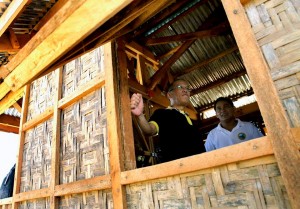 Unfortunately, the problems that came with Typhoon Yolanda continued to batter the country in 2014. While there are no strong winds and surges involved, the heavy air of egos and surge of political bickering dampened the progress of Yolanda rehabilitation. There have been accusations that the Aquino government’s rehabilitation efforts were too slow and that funds were withheld. Curiously, it took a year before a Yolanda rehabilitation plan was finally approved by President Aquino.
Unfortunately, the problems that came with Typhoon Yolanda continued to batter the country in 2014. While there are no strong winds and surges involved, the heavy air of egos and surge of political bickering dampened the progress of Yolanda rehabilitation. There have been accusations that the Aquino government’s rehabilitation efforts were too slow and that funds were withheld. Curiously, it took a year before a Yolanda rehabilitation plan was finally approved by President Aquino.
Former senator Panfilo Lacson was appointed as the Yolanda rehabilitation czar and it was unsurprising to see him encountering issues here and there. He even had skirmishes with Aquino allies. That he would engage in a verbose bickering with the Romualdez mayor of Tacloban is already expected. The rehabilitation czar may have tried his best but the political pressure and faults of both the Aquino and Romualdez sides may have been too much for him to deliver stellar results. It’s difficult to say that Lacson did a great job.
Ebola and major DOH blues
No Ebola infection reached the Philippines to actually gauge the effectiveness of the country’s preparations against it. Nevertheless, it still managed to make its presence felt. The subtle panic created by the disease showed how the country is poorly equipped to handle and control an infection. Likewise, it exposed the kind of competence the country’s health officers have in dealing with the threat. For one, acting DOH Secretary Garin demonstrated how it is to invalidate the purpose of a quarantine by visiting and interacting the quarantined peacekeepers without any form of protection. She defended her action partly as a way of alleviating public panic. However, the Philippine College of Physicians criticized the unprotected visit and interaction. It was unnecessary and highly risky. While it is true that Ebola is not yet communicable sans the symptoms, it’s difficult to conclude if the quarantined soldiers did not really have any of the symptoms.
The Department of Health, under the temporary leadership of Janet Garin, is not as dependable based on Garin’s “quarantine stunt” alone. However, there is a bigger problem in the DOH. There are allegations of corruption on previous officials and the change in leadership seems to be causing divisiveness in the agency. Hopefully, all of these don’t escalate into something bigger. The country does not need additional problems especially with the lingering Ebola threat and other health issues lying in wait.
Underperforming economy
The Philippine economy fared better than those of other members of the Association of Southeast Asian nations. Foreign direct investments (FDI) exceeded government targets. Remittances from overseas Filipino workers, as usual, increased. Additionally, the business process outsourcing, construction (private), and mining sectors performed well. However, economic growth in 2014 has been below expectations and projections. Unfortunately, what some economists said about the economy picking up because of the Yolanda rehabilitation efforts failed to materialize. The Aquino government has forgone many opportunities because of underspending.
So why did President Aquino underspend? It won’t be surprising for him to claim that it was due to the Supreme Court’s ruling on DAP. However, he is already running out of credible excuses. How can he justify the failure or refusal to spend the budget his government asked for 2014 when DAP, to begin with, was not part of that budget? Also, certainly, Gloria Arroyo and the barely there opposition politicians can no longer be blamed for Aquino’s economic lapses.
Interestingly, there are insinuations that the underspending for 2014 is deliberate. President Aquino could be trying to throttle this year’s economic growth to make it easier to achieve more impressive figures next year. Of course, if 2014’s economic performance isn’t stellar, a better performance next year will easily translate to more impressive growth rates. Impressive economic numbers will be useful in trying to prevent Aquino from becoming a lame duck. It may also lend him some credibility as he anoints his successor.
An even darker side of Binay
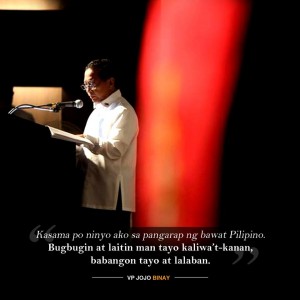
This year, the Vice-President graduated from being taunted for his dark skin to being assailed for his even darker secrets. One by one, allegations of corruption and serious misdeeds against the second highest ranking official of the country are surfacing. From the allegedly overpriced Makati Parking Building to the so-called Hacienda Binay and the recently investigated Makati Science High School overprice, it seems the worst is yet to come for the former Makati mayor who wants to become the next president of the Philippines. There’s something darker in the Binay who cheated on his wife, refused to heed to President Aquino’s call to shun the wang-wang, raised and defended children who don’t respect protocols, and backed off from a debate challenge he himself posed.
Definitely, these revelations could only be considered advantageous for the country. Thanks to 2014’s forte of highlighting the negatives, the public is now forewarned of the dark side of the 2016 presidential elections front-runner. It’s dismaying to find out that Filipinos voted for a gravely corruption-tainted politician to become the country’s vice-president but it’s rather consolatory that all of these are slowly being revealed more than a year before the presidential elections.
The luxurious lifestyle of high profile criminals in Bilibid
Neither surprising nor shocking: The New Bilibid Prison has VIP inmates who enjoy luxurious lifestyles. More than just the access to mobile phones and computers, these inmates have wireless Internet connection, Jacuzzis, entertainment systems, and hotel-like rooms with full furnishing and myriad appliances. Some even managed to build a recording studio and a concert stage. Others have copious wads of cash that they need money counters to have these accounted for. It’s not surprising to find drugs and guns but all of these exist inside Bilibid in amounts and forms that can still be shocking. Just imagine your reaction to a machine gun being hauled out of one prison cell.
You just have to “bilibid.” All of these were found and confiscated inside the prison cells of what is supposedly the country’s main maximum security penitentiary after Department of Justice Secretary Leila De Lima conducted a surprise inspection inside the New Bilibid Prison compound. Disappointingly, this inspection wouldn’t have happened had there been no exposé from one leading media network. Nevertheless, the open secret is now made more open so the government should just do its job and put things in their right order.
Another offense by a US serviceman and VFA issues
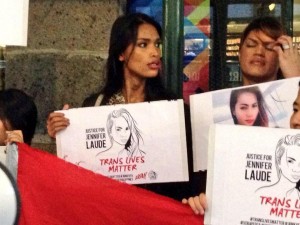 Many Filipino politicians have always wanted to have the VFA reviewed or even cancelled. This year, another reason adds to the need to have the Visiting Forces Agreement reevaluated. The death of transgender Jennifer Laude allegedly caused by American Private First Class Joseph Scott Pemberton shows how the Philippines is being treated as an inferior party in an agreement with the United States.
Many Filipino politicians have always wanted to have the VFA reviewed or even cancelled. This year, another reason adds to the need to have the Visiting Forces Agreement reevaluated. The death of transgender Jennifer Laude allegedly caused by American Private First Class Joseph Scott Pemberton shows how the Philippines is being treated as an inferior party in an agreement with the United States.
The death of Laude is not just a simple case of murder. It is even more than just an issue of prejudice or hate against homosexuals or transexuals. It is a case that highlights the kind of treatment Americans accord to Filipinos. This year has shown how vague the VFA is in its role in helping the country deal with foreign forces that are intruding into Philippine territory, in addressing the Chinese incursion into Philippine waters in particular. After the Laude-Pemberton case, it is becoming even clearer that the Philippines is not given the kind of respect it deserves as an ally.
Malacañang’s budget maneuvers and deception
Again, President Aquino can brag that the country will not be having a reenacted budget next year. The President signed the 2015 National Budget Law before the year ended. But behind this feat being touted by the Aquino government as an indication of efficiency is the multitude of deception and maneuvering to retain the shadow of Aquino’s DAP practice. The 2015 National Budget is viewed as an attempt to legalize DAP by introducing a new definition of savings (which contradicts the ruling made by the Supreme Court). Moreover, there are appropriations deemed suspicious like the irrigation projects for LGUs (which should be under the National Irrigation Administration), as cited by Aquino ally Senator Miriam Santiago.
2014 has shown how easy it is for a popular president to deceive people to avoid disturbing the political status quo. Hopefully, the remaining principled politicians of this country realize how Aquino is already overusing his popularity to further the same old patronage politics that he supposedly wants to quash with his Tuwid na Daan theme. Thankfully, the country has promptly uncovered the darkness behind another extremely popular would-be presidential candidate. Voters should have learned enough from President Aquino’s term. Popularity rarely depicts the true nature of a person’s character. Instead, it is a very effective tool for deception and a long-lasting fuel for detrimental egocentrism.
2013 ended with a Binay news item that eventually led to opinion columns buzzing with unflattering pieces about the Binays as 2014 started. Let’s hope 2014 is not going to end with another Binay issue. Better yet, let’s hope that the year culminates with something good even if it’s about the Binays – like more solid evidences on their alleged corruption.


